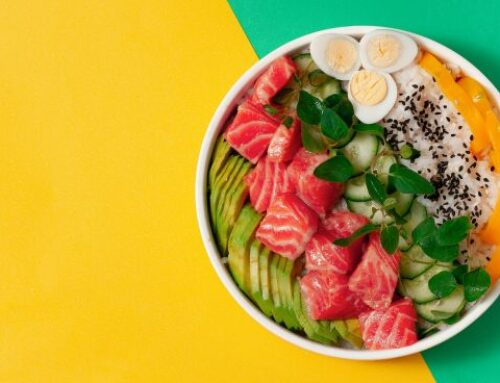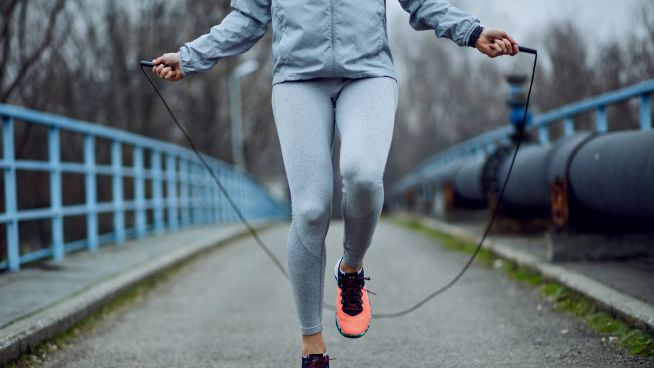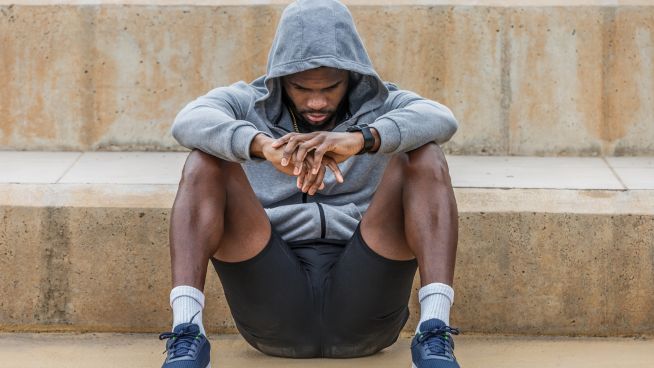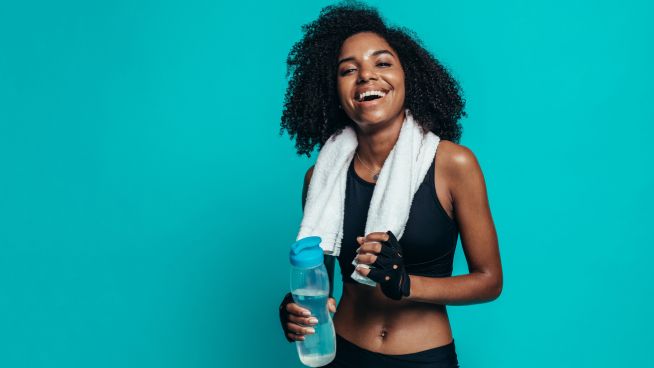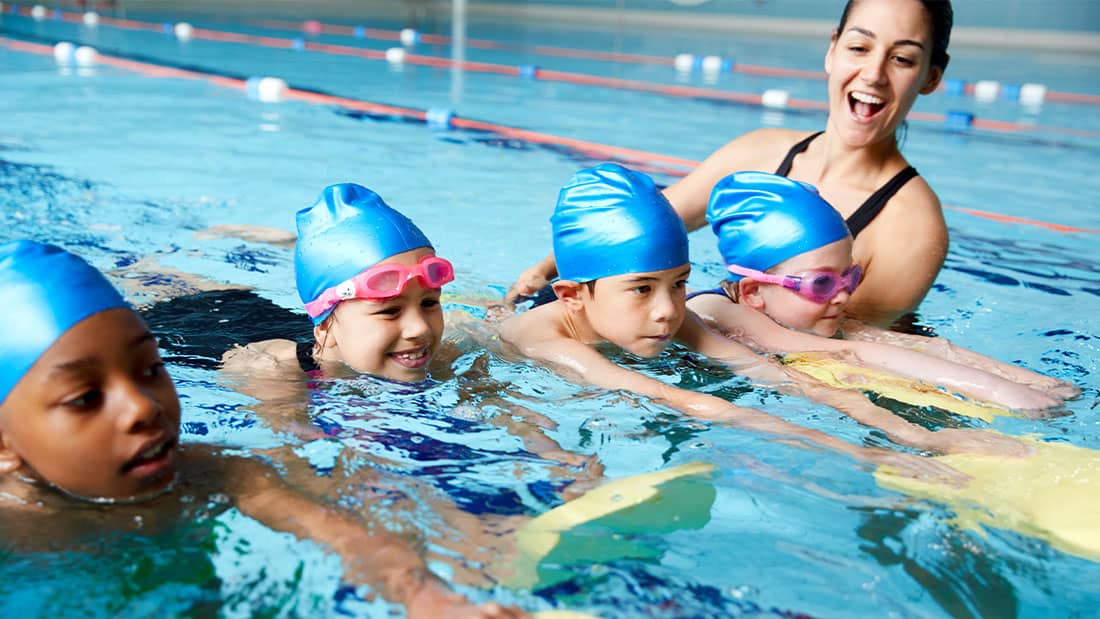Going vegan isn’t without risk, particularly for athletes who burn a monster amount of calories every day.
Case in point? David Johnson.
The Arizona Cardinals star running back went full vegan ahead of the 2017 season, which led to his dramatic—and unwanted—weight loss. From ESPN Staff Writer Josh Weinfuss:
Last training camp, David and his wife, Meghan, decided to ditch animal products and start a vegan diet after watching two documentaries on Netflix: “What the Health” and “Forks Over Knives.”… He had to eat foods he’d never imagined himself trying, like avocados, lentils and quinoa. While his teammates were chowing down on cheeseburgers, Johnson ate bean burgers. Everywhere David ate, his options were limited to just one, maybe two, items on the menu.
The pounds suddenly started melting off Johnson, who didn’t have much body fat to began with. He lost 14 pounds in less than two weeks. The increase in plant-based foods did make him feel more energetic and agile, but for a running back who tied for the third-most rushing attempts of any NFL player in 2016, his quickly decreasing body weight was a deal breaker.
“My body felt great,” Johnson said. “I felt energized. I felt like my body was recovering, but I just couldn’t keep the weight on.”
Weinfuss noted that “With the weight went Johnson’s muscle mass. For a power runner, it was the worst possible scenario.” After just three weeks, Johnson ditched the vegan diet and decided to resume eating meat.
When the team’s season opener against the Detroit Lions rolled around, Johnson was still significantly lighter than his normal playing weight. While he excelled as a receiver in the game, he totaled just 23 rushing yards on 11 attempts. Then, in the third quarter, he suffered the broken wrist which would sideline him for the rest of 2017. To draw any correlation between the vegan diet and the injury would be irresponsible, but Johnson knew he wanted to come back bigger in 2018.
However, his vegan experiment wasn’t without benefit. While Johnson does now eat meat and animal products, his intake is significantly less than it once was. To fill in the gap, he’s integrated more plant-based foods into his diet. After long abhorring options like avocado, lentils and quinoa, they now make frequent appearances on his plate, and he genuinely enjoys consuming them.
“I’m learning what to do to recover faster. I’m getting more massages, eating, maintaining the diet and really just figuring out ways to stay in shape,” Johnson says. “I think I can do a lot better than what I did in 2016, personally.”
Johnson’s issues on a vegan diet are not uncommon for athletes. While it’s certainly possible to excel on the diet, it takes a lot of time and energy to figure out how to make it work for you. Both elite and adolescent athletes torch a tremendous amount of calories on a daily basis, and when they suddenly switch to a vegan diet with little planning, replacing the calories meat and dairy products once provided can be a big challenge.
Damian Lillard, an All-Star point guard for the Portland Trailblazers, had a similar experience with veganism last season. After sticking with the diet for five months, he eventually dropped it because he found himself losing too much weight. But like Johnson, he learned to love a lot more plant-based foods through the experience.
“I did it, but I started to lose a little bit too much weight with all the games and practices and all that,” Lillard said on an edition of the RUN A.M.C. podcast in January. “I had to balance it out, so now I’ve been mixing it up a little bit more, having vegan meals, still mixing it up with other stuff…I had a few injuries, so I was trying to get lighter and trying to get healthier and put better stuff in my body. It helped a lot as far as my energy and how I felt.”
Olympic legend Carl Lewis adopted a vegan diet in the later half of his competitive career. For the first six months after the change, he struggled to consume enough calories. He immediately lost a significant amount of weight and often felt lethargic. Lewis had trouble consuming enough calories before he went vegan, so the switch brought significant struggle.
“We discussed it, and the problem wasn’t protein—I was eating plenty of protein. I wasn’t eating enough calories. That’s what I realized. You have to really eat in order to get the calories. And remember, I was someone who wasn’t eating very much. Breakfast was like taboo. So the biggest adjustment I had to make was to actually start eating,” Lewis told STACK. Lewis soon found that having a private chef with a knowledge of nutrition do his cooking for him his transition to veganism much more effective.
“A lot of people say ‘Oh, it’s good to do a vegan diet.’ Well it’s not that easy, especially as an athlete, unless you have someone that’s prioritizing your meals,” Lewis says. “Obviously, you have to eat more. You have to watch what you eat. You have to find things and figure out ways to make it work. It took a while for my body to adjust and figure it out and for my cook to (bulk) up my meals, slide in the snacks (throughout the day). It really took six months for me to figure it out.”
Once Lewis was able to optimize his diet, he noticed a big uptick in his energy and vigor. The effects of his new diet were on full display at the 1991 World Championships. The event, which took place shortly after Lewis’s 30th birthday, is regarded as one of the most dominant displays in track and field history. He won a gold medal and set a world record in the 100-Meter Dash, before setting another world record in the Long Jump.
The takeaway? Going vegan certainly has its benefits, but it’s not a diet where you can really “wing it”—particularly for athletes. Even for pros who have private chefs and teams of nutritionists to work alongside them, the adjustment can take a significant amount of time. In an age when vegan diets are often treated as a panacea, it’s important to know they aren’t without their own unique hazards. If you are interested in following a vegan or vegetarian diet, here’s what you need to know. And if you are going to take the plunge, it’s probably best to give yourself some time to work out the kinks as opposed to making the change right before your season.
READ MORE:
RECOMMENDED FOR YOU
MOST POPULAR
Going vegan isn’t without risk, particularly for athletes who burn a monster amount of calories every day.
Case in point? David Johnson.
The Arizona Cardinals star running back went full vegan ahead of the 2017 season, which led to his dramatic—and unwanted—weight loss. From ESPN Staff Writer Josh Weinfuss:
Last training camp, David and his wife, Meghan, decided to ditch animal products and start a vegan diet after watching two documentaries on Netflix: “What the Health” and “Forks Over Knives.”… He had to eat foods he’d never imagined himself trying, like avocados, lentils and quinoa. While his teammates were chowing down on cheeseburgers, Johnson ate bean burgers. Everywhere David ate, his options were limited to just one, maybe two, items on the menu.
The pounds suddenly started melting off Johnson, who didn’t have much body fat to began with. He lost 14 pounds in less than two weeks. The increase in plant-based foods did make him feel more energetic and agile, but for a running back who tied for the third-most rushing attempts of any NFL player in 2016, his quickly decreasing body weight was a deal breaker.
“My body felt great,” Johnson said. “I felt energized. I felt like my body was recovering, but I just couldn’t keep the weight on.”
Weinfuss noted that “With the weight went Johnson’s muscle mass. For a power runner, it was the worst possible scenario.” After just three weeks, Johnson ditched the vegan diet and decided to resume eating meat.
When the team’s season opener against the Detroit Lions rolled around, Johnson was still significantly lighter than his normal playing weight. While he excelled as a receiver in the game, he totaled just 23 rushing yards on 11 attempts. Then, in the third quarter, he suffered the broken wrist which would sideline him for the rest of 2017. To draw any correlation between the vegan diet and the injury would be irresponsible, but Johnson knew he wanted to come back bigger in 2018.
However, his vegan experiment wasn’t without benefit. While Johnson does now eat meat and animal products, his intake is significantly less than it once was. To fill in the gap, he’s integrated more plant-based foods into his diet. After long abhorring options like avocado, lentils and quinoa, they now make frequent appearances on his plate, and he genuinely enjoys consuming them.
“I’m learning what to do to recover faster. I’m getting more massages, eating, maintaining the diet and really just figuring out ways to stay in shape,” Johnson says. “I think I can do a lot better than what I did in 2016, personally.”
Johnson’s issues on a vegan diet are not uncommon for athletes. While it’s certainly possible to excel on the diet, it takes a lot of time and energy to figure out how to make it work for you. Both elite and adolescent athletes torch a tremendous amount of calories on a daily basis, and when they suddenly switch to a vegan diet with little planning, replacing the calories meat and dairy products once provided can be a big challenge.
Damian Lillard, an All-Star point guard for the Portland Trailblazers, had a similar experience with veganism last season. After sticking with the diet for five months, he eventually dropped it because he found himself losing too much weight. But like Johnson, he learned to love a lot more plant-based foods through the experience.
“I did it, but I started to lose a little bit too much weight with all the games and practices and all that,” Lillard said on an edition of the RUN A.M.C. podcast in January. “I had to balance it out, so now I’ve been mixing it up a little bit more, having vegan meals, still mixing it up with other stuff…I had a few injuries, so I was trying to get lighter and trying to get healthier and put better stuff in my body. It helped a lot as far as my energy and how I felt.”
Olympic legend Carl Lewis adopted a vegan diet in the later half of his competitive career. For the first six months after the change, he struggled to consume enough calories. He immediately lost a significant amount of weight and often felt lethargic. Lewis had trouble consuming enough calories before he went vegan, so the switch brought significant struggle.
“We discussed it, and the problem wasn’t protein—I was eating plenty of protein. I wasn’t eating enough calories. That’s what I realized. You have to really eat in order to get the calories. And remember, I was someone who wasn’t eating very much. Breakfast was like taboo. So the biggest adjustment I had to make was to actually start eating,” Lewis told STACK. Lewis soon found that having a private chef with a knowledge of nutrition do his cooking for him his transition to veganism much more effective.
“A lot of people say ‘Oh, it’s good to do a vegan diet.’ Well it’s not that easy, especially as an athlete, unless you have someone that’s prioritizing your meals,” Lewis says. “Obviously, you have to eat more. You have to watch what you eat. You have to find things and figure out ways to make it work. It took a while for my body to adjust and figure it out and for my cook to (bulk) up my meals, slide in the snacks (throughout the day). It really took six months for me to figure it out.”
Once Lewis was able to optimize his diet, he noticed a big uptick in his energy and vigor. The effects of his new diet were on full display at the 1991 World Championships. The event, which took place shortly after Lewis’s 30th birthday, is regarded as one of the most dominant displays in track and field history. He won a gold medal and set a world record in the 100-Meter Dash, before setting another world record in the Long Jump.
The takeaway? Going vegan certainly has its benefits, but it’s not a diet where you can really “wing it”—particularly for athletes. Even for pros who have private chefs and teams of nutritionists to work alongside them, the adjustment can take a significant amount of time. In an age when vegan diets are often treated as a panacea, it’s important to know they aren’t without their own unique hazards. If you are interested in following a vegan or vegetarian diet, here’s what you need to know. And if you are going to take the plunge, it’s probably best to give yourself some time to work out the kinks as opposed to making the change right before your season.
READ MORE:


